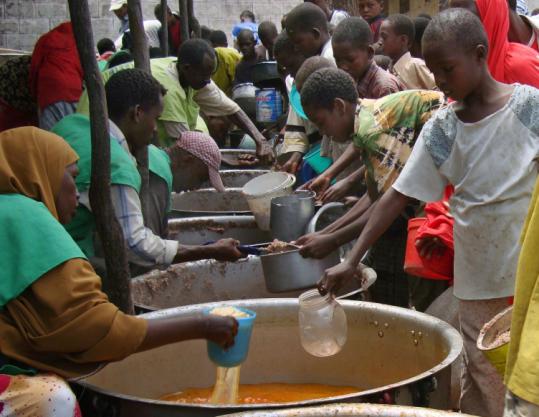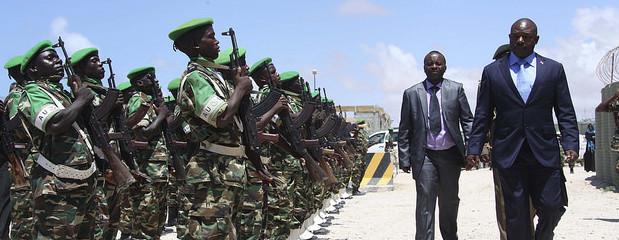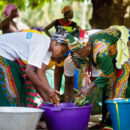Food Crisis in the Horn of Africa: International Response Driven By Image of Africa – By Peter Gill
International responsiveness to the food crisis in the Horn of Africa has relied again on the art of managing the headlines. Sophisticated early warning systems that foresee the onset of famine have been in place for years, but still the world waits until it is very nearly too late before taking real action – and then paying for it.
The big aid organisations, official and non-government, are right to say they have been underlining the gravity of the present emergency for months, at least from the beginning of the year. On June 7 FEWS NET (the Famine Early Warning Systems Network funded by USAID) declared that more than seven million in the Horn needed help and the “˜current humanitarian response is inadequate to prevent further deterioration.’ Two seasons of very poor rainfall had resulted “˜in one of the driest years since 1995.’ Still the world did not judge this to be the clarion call for decisive intervention.
Three weeks later, on June 28, OCHA (the UN’s Office for the Coordination of Humanitarian Affairs) said that more than nine million needed help and that the pastoral border zones of Somalia, Ethiopia and Kenya were facing “˜one of the driest years since 1950/51.’ Six decades! Two generations! A story at last! The media mountain moved, and the NGO fund-raisers marched on behind.
I have The Times of July 5 in front of me. “˜Spectre of famine returns to Africa after the worst drought for decades,’ says the main headline in World news. On page 11 there is a half-page appeal from Save the Children illustrated with a picture of a six-week old Kenyan called Ibrahim “˜facing starvation.’ On page 17 Oxfam has its own half page saying that “˜more than 12 million people have been hit by the worst drought in 60 years.’ The Times that day also carried a Peter Brookes cartoon of a hollow-faced African framed in the map of Africa, with his mouth opened wide for food.
So, for 2011, an image of Africa has again been fixed in the western consciousness. It is an image of suffering – worse, of an impotent dependence on outsiders – that most certainly exists, but is only part of the story, even in the Horn.
The western world may understand something of the four-way colonial carve-up and the post-colonial disaster that overtook the Somali homeland, but it certainly has no proper answers to the conflicts and dislocation that lead to starvation and death. In northern Kenya, to which so many thousands of Somali pastoralists have fled in recent months, the West does have an answer of sorts – it can feed people in the world’s largest refugee camp, in the thin expectation of better times back across the border. Then there is Ethiopia, with several million of its own people needing help, its own Somali population swollen by refugees, and the country for ever associated with the terrible famine of 25 years ago which launched the modern era of aid.
Here it is possible to make some predictions. There will be no widespread death from starvation in Ethiopia, not even in its own drought-affected Somali region where an insurgency promotes insecurity and displacement. New arrangements between the Ethiopian government and the UN’s World Food Programme have insured more reliable and equitable food distribution, and the Government presses on with schemes to settle pastoralists driven by persistently poor rains from their semi-nomadic lifestyles.
The government of Meles Zenawi, which has just marked 20 years in power, has on the whole a creditable record in response to the prospect of famine. In 2003/4 the country faced a far larger food crisis than it did it in 1984, but emerged from it with very few extra deaths. In the former famine lands of the North where there is an impressive commitment to grass-roots development there is almost no chance of a return to the evil days of the 1970s and 1980s.
When mistakes are made, they are sometimes admitted. Meles himself appears personally determined to combat the extreme poverty which blights his country’s reputation and is more open to discussing it than some who represent his government abroad. After the serious food crisis in southern Ethiopia of three years ago, he told me they had failed to heed the warning signals and were simply late in their response. More candidly still, he attributed the failure to a northern-dominated government failing properly to understand southern cropping patterns.
The questions raised by the latest African food crisis are not for Africa alone. Ethiopia must keep addressing the image of destitution and the reality that too often underpins it, but it needs to promote other images as well. Instead of the risk of starvation, it also needs to be able to draw attention to impressive annual economic growth figures. Instead of food hand-outs, it also needs to be able to emphasise its big drive for inward investment.
The media can be held to account for the image it projects of Africa, and so must the aid organisations. Unlike the press, they set themselves “˜development’ objectives. When Meles Zenawi accepted some of the blame for underplaying the last Ethiopian food crisis, he also had harsh words for the aid-givers. He accused UN agencies and the NGOs of magnifying the country’s problems, and added: “˜My own interpretation of the reasons for exaggerating is because they have to shock and awe the international community in order to get money.’ Another campaign of “˜shock and awe’ has just got under way.
____________________________________
Peter Gill is the author of Famine and Foreigners: Ethiopia since Live Aid published last year by Oxford University Press







[…] He is the author of Famine and Foreigners: Ethiopia Since Live Aid. This post first appeared on the Royal Africa Society blog, and is reposted with […]
[…] which drives this recourse to familiar visuals. # In an excellent post on the coverage of the Horn, Peter Gill argues that “sophisticated early warning systems that foresee the onset of famine have been in place for […]
[…] Gill, who recently wrote a book about famine in Ethiopia, has this to say about the impending famine in the Horn of Africa: I have The Times of July 5 in front of me. ‘Spectre of famine returns to Africa after the […]